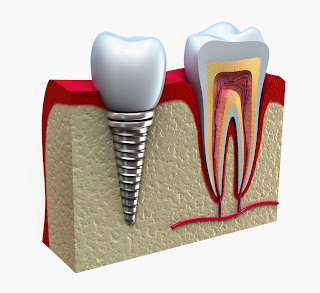What are Dental Implants?
Implants are an ideal dental
restoration for people missing one or more teeth that resulted from an
injury or periodontal disease. Dental
implants are composed of three parts:
·
The titanium
implant that fuses with the jawbone
·
The abutment (fits
over portion of the implant that protrudes from the gum line)
To sum up those three
components, it’s a metal post that a periodontist or oral surgeon surgically
positions into your jaw. Once in place
and when the surrounding bone has had ample time to heal, a replacement tooth
is attached to the post. There are two
types of dental restoration implants:
·
Endosteal: meaning
“in the bone,” this is the most common type of implant and is placed into your
jawbone. This is generally used as an
alternative for our patients with bridges
or removable dentures.
·
Subperiosteal:
meaning “on the bone,” is placed on top of jaw with the metal framework’s posts
protruding through the gums to hold the prosthesis. Our patients who have these are usually the
ones who are unable to wear conventional dentures and who have minimal bone
height.
Why get a Dental Implant?
While dental implants are
more expensive than other methods for replacing your teeth, they provide far
superior benefits. They combine the best
of modern science and technology.
Implants are stronger than natural teeth and generally last 10-20 years! They are also a more favorable approach than
bridgework since they do not depend on the neighboring teeth for support.
To receive implants, you
need to have healthy gums and adequate bone to support the implant. In addition, you must be committed to
excellent oral hygiene and regular dental cleanings as these are crucial to the long-term success of the
implant.
What is the Implant Process like?
Placing an implant is truly a team effort – a team made up of you, the
patient; our restorative dentistry
expert, our Valencia dentists; and the oral/maxillofacial surgeon placing the
implant.
What makes our Valencia dental facility unique and unlike any other is
that we have teammate that no other facility has. In fact, very few do in the entire
world. It’s called the Cone Beam 3D Scanner. Feel free to visit our
technology section of our website for more information on this scanner but in a
nutshell, it allows us plan implants without having to physically explore your
mouth. We can perform our implant
surgeries on our computer workstations before performing them on our patients! By duplicating the results of our virtual
implant placement to our patients, we practically eliminate all complications
leading to short procedure times. Sounds
too good to be true right? That’s
exactly why we have one in our Valencia dentist office. Nothing is too good for our patients and we
want only the best for you.
If you are looking for more information on dental implants, WebMD offers
a valuable self-help resource.
Posted by Go Dental, Your Valencia Dentist.


